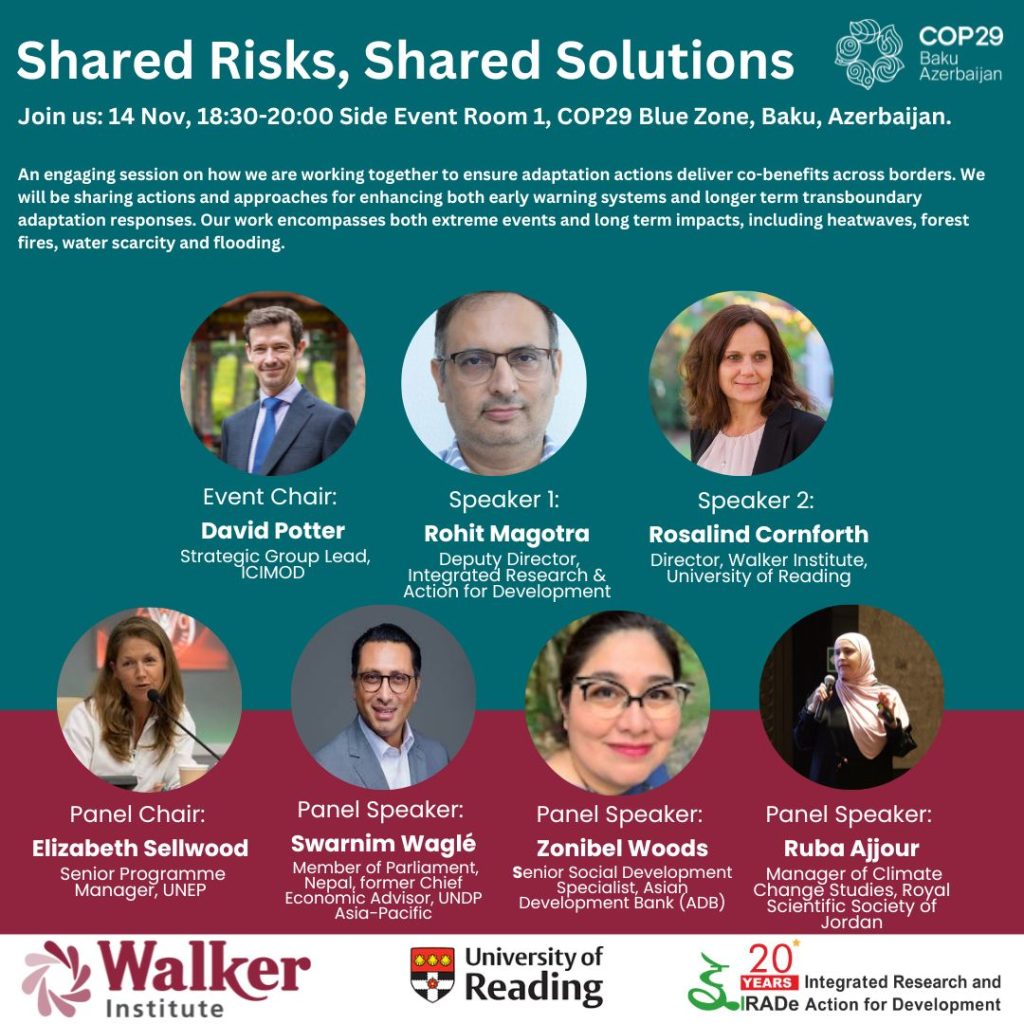COP29 Side Event
Thu. 14 November 2024
18:30 – 20:00 UTC/GMT +4
Side Event Room 1, COP29 Blue Zone, Baku, Azerbaijan
View the recorded session
Addressing transboundary climate risks via shared adaptation actions is “no-one’s job” – and in many cases it is ignored. This is an especially serious problem in conflict-affected regions, in which relations between countries are already strained or where there are no shared environmental governance mechanisms. The COP28 Declaration on Relief, Recovery and Peace called for a major increase in adaptation investment in conflict-affected and fragile countries. As we push for scaled-up adaptation, we need to be aware of and factor in the transboundary dimensions to ensure that all affected communities’ benefit from adaptation actions. COP29 is a vital opportunity to push forwards methodological approaches which acknowledge prevailing constraints and local and social contexts, while ensuring a scientific basis for planning, to enable cooperative adaptation action. Shared risks require shared solutions.
The purpose of this side event was (i) to bring together political leaders, scientists, civil society and non-state actors to reflect on the transboundary climate risks in South Asia and Middle East region; (ii) to highlight the importance of transboundary cooperation in identifying durable, mutually beneficial adaptation solutions, and (iii) to demonstrate, using specific cases, how such transboundary cooperation is currently being mobilised – including in conflict-affected regions, to accelerate cooperative adaptation action and policy making. The event was led by the Walker Institute at the University of Reading, and Integrated Research & Action for Development (IRADe), supported by the UNEP, as part of a unique collaboration across transboundary, regional and national adaptation planners in South Asia and the Middle East. A community of international scientists evidenced how we are working together to ensure adaptation actions deliver co-benefits across borders and will be sharing actions and approaches for enhancing both early warning systems and longer term transboundary adaptation responses. Our work encompasses both extreme events and long term impacts, including heatwaves, forest fires, water scarcity and flooding.
It was followed by a second event on Saturday 16th November in the UN Pavilion from1300-1500 led by the UNEP, the Walker Institute at the University of Reading, and the Royal Scientific Society.
We really would like to hear from others during these events on the processes we can use to assess risk at the local level “My” Climate Risk and support evidence-based dialogue for transboundary cooperation on adaptation. In particular, what innovations and tools are being used that can translate science-based interventions into viable adaptation options and make them useable in a conflict setting?” The event will therefore include an interactive tool for the audience, online and on the ground, to contribute to the panel discussion and respond to the questions being asked.
Speakers
Event Chair: Dr David Potter, Strategic Group Lead, ICIMOD, Nepal
Panel Chair: Ms Elizabeth Sellwood, Senior Programme Manager, UN Environment Programme
Speaker 1: Prof. Rosalind Cornforth, Director, Walker Institute, University of Reading, UK
Speaker 2: Mr. Rohit Magotra, Deputy Director, Integrated Research & Action for Development (IRADe), India
Panel Speakers
Dr Swarnim Waglé, Member of Parliament, Nepal (and former Chief Economic Advisor, UNDP Asia-Pacific)
Ms Zonibel Woods, Senior Social Development Specialist, Asian Development Bank (ADB), Philippines
Eng. Ruba Ajjour, Manager of Climate Change Studies; Royal Scientific Society, Jordan
Prof. Abdou Ali, Head of the Information and Research Department, AGRHYMET, Niger

















